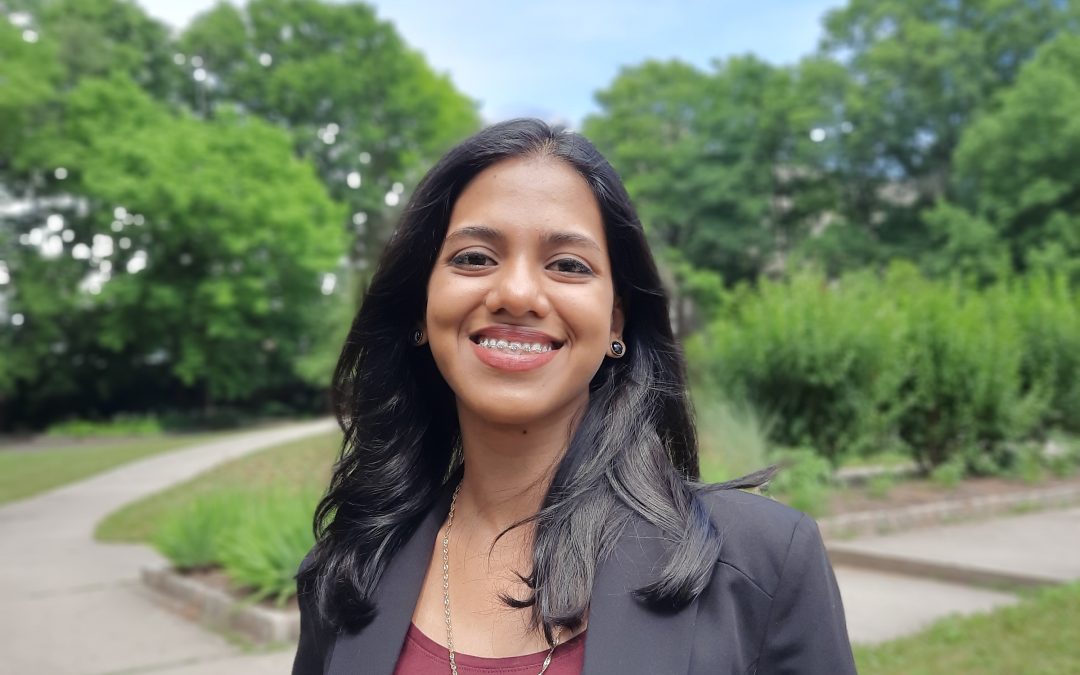
by Mohamed Elshekh | May 18, 2021 | Internship Experiences, Undergraduate Students
My name is Harshana Ghoorhoo, and I am a junior majoring in Diplomacy and International Relations, Modern Languages, and Philosophy. I am currently a research intern at the Modern War Institute (MWI) at West Point Academy. MWI is a national resource within the Department of Military Instruction that provides a unique platform to conduct studies on recent and ongoing conflicts to help military leaders navigate today’s complex world. MWI’s projects include activities such as scholarship, multi-disciplinary battlefield assessments, symposia, among others.
Given my interest in studying military strategy, urban warfare, and military classical thought, the internship has been key in fostering the necessary skills and knowledge that will prepare me for a career in military studies. So far, I have assisted with the publication of MWI-affiliated scholarship through research, formatting, editing, and fact-checking, which has given me a better understanding of the process behind producing publishable reports and articles. Currently, I am working directly under the director of research and the chair of the urban war studies department. I am involved with two major projects researching U.S. military history and military strategy of former U.S. presidents during the Revolutionary War. Additionally, I am writing a series of urban battle reports for MWI’s Department of Urban War Studies.
The support I have received from my supervisors is incredible. They have been very friendly, responsive, and have encouraged me to take up projects that capture my interest. Working with them makes me enjoy completing my internship hours and pushes me to continue contributing to the research projects currently underway at MWI. Even though my internship is remote this semester, I am fortunate to be working in an environment that remains highly productive despite the restrictions imposed by COVID-19. My weekly calls with my supervisor always start with a small recap of our respective week, sharing ideas, talking about interesting news, academic updates, and so on. He has been more than a supervisor; he has been a valuable mentor.
Working at MWI has given me important insight into how think tanks and research institutes function and how to succeed in the sphere of research and academia. My involvement with Seton Hall’s student organizations has been instrumental because they have provided me with vital skills that I am actively using in my current role as a research intern. My role as an editor for the Diplomatic Envoy has proved consequential since I write urban battle reports and occasionally copy-edit articles submitted to the MWI. As a research assistant at the DiploLab, I have learned essential skills in conducting research that I regularly translate to my work at MWI.
My internship rarely feels like I carry a workload. On more than one occasion, I have opted to write a battle report or start a new project in my spare time because of the excitement and passion I have for the work. Of course, having supportive supervisors has been key in enabling these sentiments. I would highly recommend MWI to anyone looking for an internship that strengthens your writing skills, expands your academic horizons, and pushes you to become a more effective researcher.
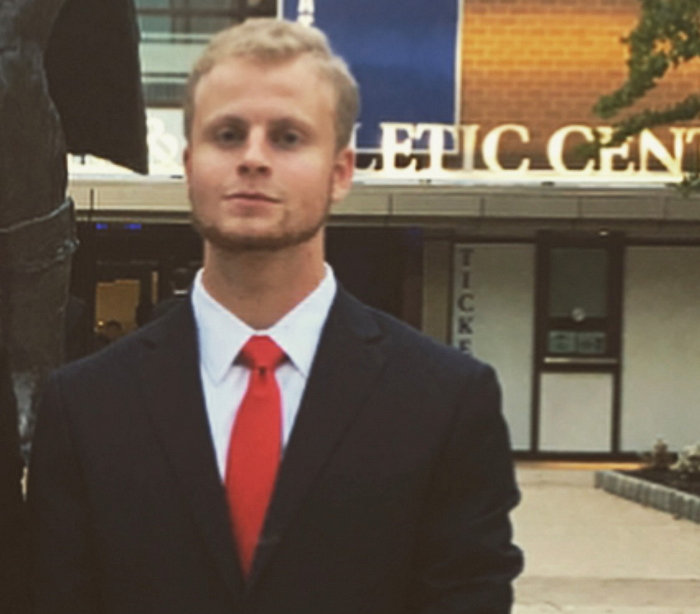
by Mohamed Elshekh | Apr 9, 2021 | Internship Experiences, Undergraduate Students
My name is Lawson Barkley, and I am a senior at Seton Hall University majoring in Diplomacy and International Relations with minors in Economics and Russian. I am currently interning with a District Court Judge in North Carolina as a research intern, and my time so far has been invaluable. I previously spent time with the judge and have come to admire his character and work ethic. His ability to foster a safe and friendly work environment, while at the same time challenging me with assignments, makes this internship very enjoyable.
As is the case with internships amidst the Covid-19 pandemic, I work remotely and spend my free time and weekends on internship assignments. This internship is incredibly flexible; therefore, I can balance my homework and internship assignments throughout the week. When it comes to my work with the District Court, my experience as a Diplomacy student aided me in the completion of all tasks. Particularly, courses like Public International Law (PIL) have prepared me for this role. Like the work I do at my internship, PIL assignments consist of reading case law and preparing case briefs that interpreted laws. This was one of the primary tasks I had to complete for my supervisor. Working on case briefs became difficult when dealing with laws that were new and had no concrete precedent from which we could derive rulings. However, once I had a strong understanding of these laws, I could sift through cases and determine where they were used, and how they were used. This is important work since judges have the power to use discretion when interpreting laws on cases.
One of the best skills I gained during my internship is the ability to effectively write case briefs. When I first started the internship, I would spend quite a bit of time on one case; however, I quickly learned that I should not read through every little detail. Now, I am better at finding where the main points of cases are, and whether to continue reading it word by word. This skill will not only help me effectively deal with case law but can be transferred to any readings that I do for my other courses.
I strongly recommend interning with a judge or lawyer for anyone interested in the field of legal studies. As a result of the pandemic, naturally, the internship was a unique experience. Internships during Covid-19 are more research-focused. In the past, I toured the courthouse and saw the inner workings of a District Court. Not only did I experience the legal field from the perspective of a judge, but I also experienced it from the perspective of a lawyer. I networked with many lawyers who have guided me concerning my place within the legal field. Overall, this internship prepared me for my future law school journey. The ability to research cases and write briefs is critical for students looking to pursue a JD. Although I did this internship remotely, I hope to connect with my supervisors and mentors in the future once the lockdown restrictions have eased.
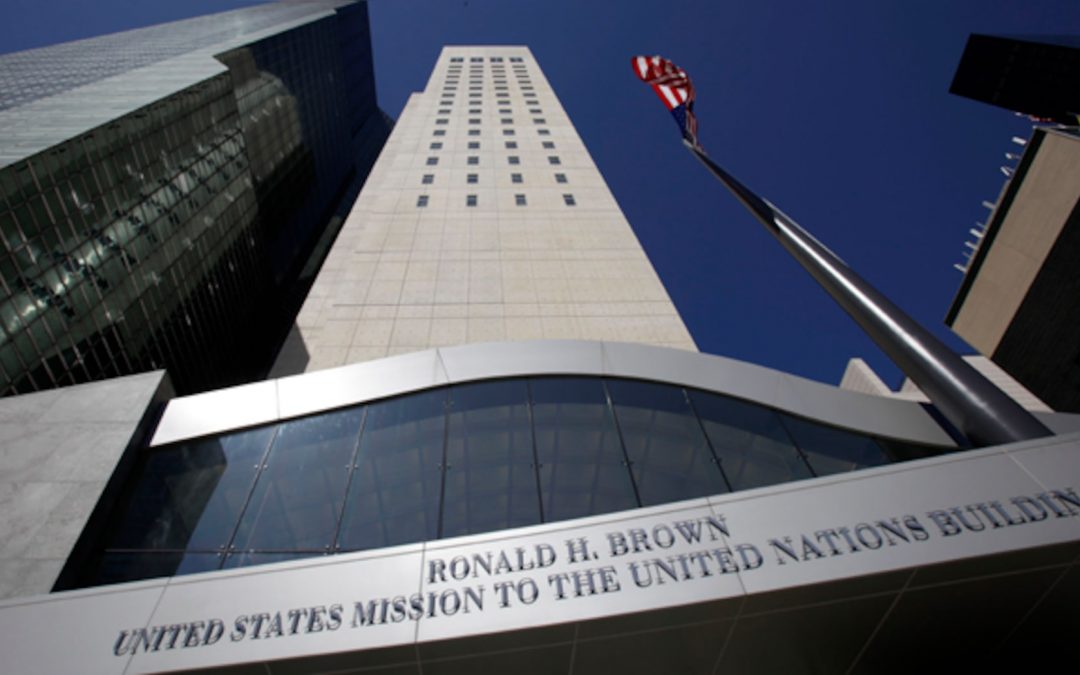
by Mohamed Elshekh | Mar 16, 2021 | Internship Experiences, Undergraduate Students
My name is Sade Nixon. I am an undergraduate senior from Chicago, Illinois completing my degrees in Diplomacy and Modern Languages. I am currently studying Russian and French, both of which I make extensive use of since starting my internship with the United States Mission to the United Nations (USUN). I am currently interning with the Political Office of USUN, which handles US Foreign policy as it pertains to Security Council activities.
The interconnectivity of my field is hitting me full force and idea-mapping to trace ripple effects and possible overlap has been beneficial. Courses such as Institutions of Global Governance and international law courses have already proven their practicality on day one. I am grateful to be confronted with things outside my comfort zone; the necessary question-asking has given me opportunities to build rapports with my senior colleagues, who have been supportive in exposing me to topics I have a specific academic interest in.
Like most things I have done to the end of pursuing my goals, working at the US Mission constantly reaffirms my career aspirations. This has always been something I have wanted to take on; now I get to have my expectations exceeded. I now have my own projects to handle and have recently completed work on negotiations of several UN Mandate renewals and Resolution revisions. Other than that, my work is mainly research on geopolitical affairs and handling initiatives for Foreign Service Officers. These tasks have certainly sped up my processing time and forced me to work on balancing thoroughness with timeliness. It has also made my professional writing more uniform and streamlined.
My tasks are mainly informative and administrative (attending meetings, drafting documents for Washington, and research, mostly), and I answer to the Foreign Service Political Officers and to the Deputies. My co-workers at my level are graduate students in international affairs programs, and my superiors are Foreign Service Officers and Political Advisors. The FSO I am partnered with directly specializes in African affairs. I am full-time, so I am working from 9am to 6pm Monday through Friday. The environment is naturally quite energetic by virtue of our scope, especially as we have now entered the 4th quarter of the year, and the FSOs are incredibly supportive in making sure the interns are working on our areas of interest. Though the DOS internships are virtual this year, the speed with which the office has adapted to working mostly online and the level of availability they maintain even when we cannot always see one another in person has been truly impressive. Challenges are mainly related to timelines and the volume of work, but I love being kept busy and the pressure has made me accustomed to managing an extremely demanding schedule and delegating to others if need be.
Over the course of my internship, my professional goals have become clear: next semester, my aim is to prepare for the Foreign Service Exam and explore my options for Graduate Schooling to obtain my master’s degree. This is due to my work experience, but also thanks to the vested interest our Officers have taken in my goals for my career.
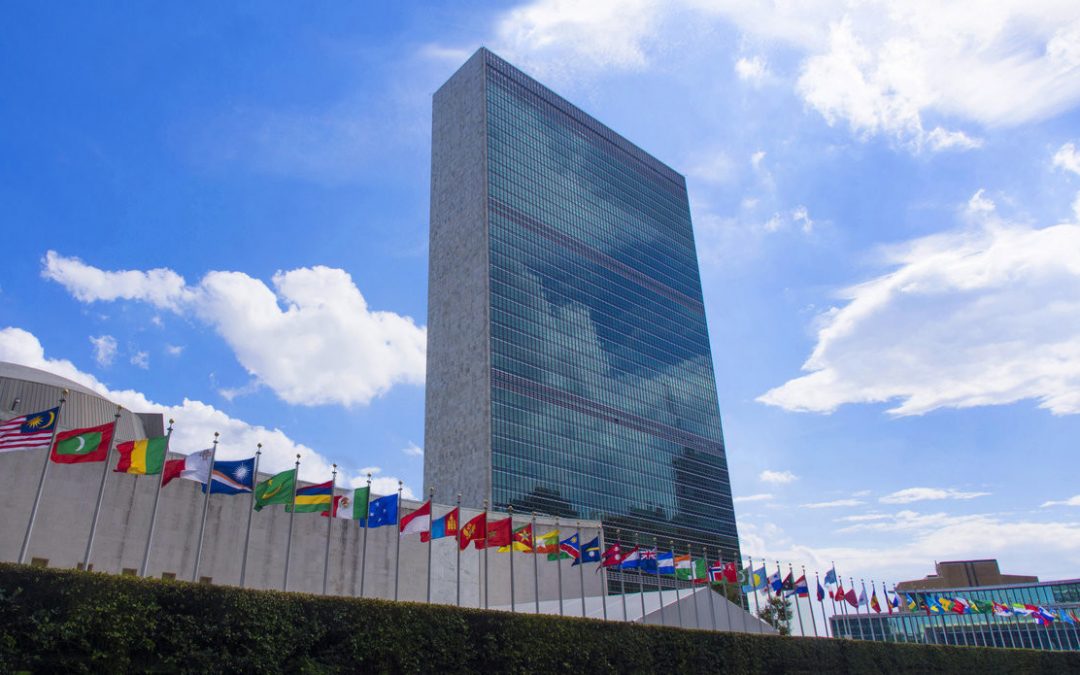
by Mohamed Elshekh | Jan 28, 2021 | Internship Experiences, Undergraduate Students
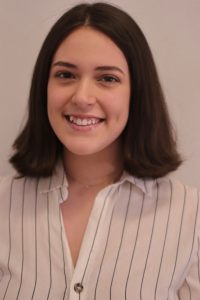 My name is Vanessa Vuji. I am currently a senior at Seton Hall University studying International Relations & Diplomacy and Modern Languages. I am working as an intern reporter for La Voce di New York, an Italian-English UN based journal. My internship has been an incredibly transformative experience – one that has shaped my academic and professional endeavors. Interning for the United Nations has always been a goal of mine, and with this internship, I am not only directly engaging with UN professionals, but I am also shaping my career path by taking on work that aligns with my interests. Being exposed to the world of political journalism has exposed me to an entirely different professional career path that I may consider in the future.
My name is Vanessa Vuji. I am currently a senior at Seton Hall University studying International Relations & Diplomacy and Modern Languages. I am working as an intern reporter for La Voce di New York, an Italian-English UN based journal. My internship has been an incredibly transformative experience – one that has shaped my academic and professional endeavors. Interning for the United Nations has always been a goal of mine, and with this internship, I am not only directly engaging with UN professionals, but I am also shaping my career path by taking on work that aligns with my interests. Being exposed to the world of political journalism has exposed me to an entirely different professional career path that I may consider in the future.
My interests in conflict resolution and international politics, coupled with my passion for journalism, prompted me to pursue an internship experience that combined all my academic interests. With the Journal, I am primarily tasked with attending press briefings and Security Council meetings. The notes that I take at these meetings allow me to write my articles, which I usually write in Italian, although I am also tasked with writing in English. These articles center on important issues taking place around the world, whether it be climate change, immigration, public health, domestic politics, or international conflict.
This internship gives me the ability to inform people on global events – events that often do not get enough coverage. For instance, one topic that I was able to research focused on the rejection of Syrian refugees from Greece. I am able to learn about international politics as well as the inner workings of the United Nations.
The research and writing that I conduct at my internship host site are skills that I learned through my coursework at Seton Hall. The skills that I learned from writing research papers and essays are directly transferable to my internship. These skills have been greatly improved since I began my internship as I am constantly researching, writing, and translating.
My Italian language skills have also greatly improved. When the internship started, I found it difficult to write articles in Italian. However, with the help of my supervisor, I strengthened my grammatical skills, particularly, my verb conjugations and translations.
The lessons I learned through this internship are numerous. Students interested in global affairs and political journalism will certainly benefit from interning with La Voce di New York. This internship is a great way to improve your writing, research, and language skills, and provides the opportunity to advocate on important issues taking place across the world.
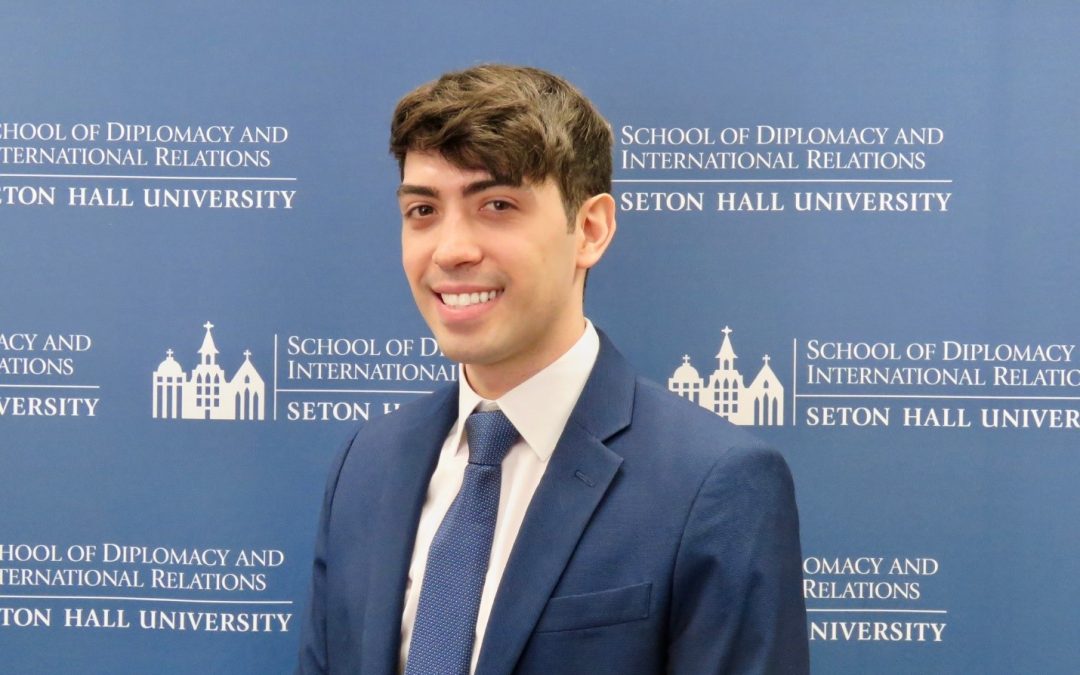
by Mohamed Elshekh | Nov 23, 2020 | Graduate Students, Internship Experiences
My name is Cristian Y. Ramos and I am in my last semester at the School of Diplomacy and International Relation’s M.A. program, specializing in International Organizations and International Law and Human Rights. I am very passionate about understanding human rights issues, particularly that of refugees and sexual violence against men and boys. My nine-month internship in the Humanitarian Office of the United Nations Population Fund (UNFPA) in New York helped me engage with my academic interests on a professional level. UNFPA is the sexual and reproductive health agency that deals with prevention and response in sexual gender-based violence (GBV), female genital mutilation (FGM), and other humanitarian priorities in 123 countries. During my time with UNFPA, I was a Policy and Liaison Intern for the humanitarian team. My duties ranged from taking notes during meetings to researching and helping the team develop innovative projects.
Some of my most meaningful projects involved doing research on sexual violence against men and boys in conflict settings and on the UN Framework on Mental Health and Psychosocial Support (MHPSS). Both projects highlighted of the need for more diverse and integrated systems to treat those suffering from mental health due to violence, human rights abuses, migration, displacement, and more recently, the effects of Covid-19. The systems that are in place to serve and treat people require that services are given to men, women, girls, boys, and the elderly without discrimination or preference. Additionally, my internship provided me with the opportunity to see diplomacy in action. During meetings with delegates and ambassadors, I experienced how my supervisors diplomatically negotiated on behalf of the agency when funds were needed to implement programs and projects at the country level.
My coursework at Seton Hall was critical to my success with UNFPA. In particular, my classes in International Human Rights and Public International Law helped me build a foundation in the discipline and understand how international organizations, like UNFPA, help advance human rights and how they can improve. My internship was incredibly transformative as it helped me acquire skills in research, diplomacy, and writing. Working at the United Nations provided me with a different set of professional skills that vary from the skills I learned in the classroom. The reports that I put together with UNFPA had to abide by a particular template, as per UN guidelines, and they needed to be written in a different style. Additionally, I learned how to conduct negotiations by observing my supervisors as well as the ambassadors and diplomats who worked with our team.
I would definitely recommend this internship to those seeking a professional environment that deals with human rights issues. UNFPA is an organization that puts theory into practice. Students will not only learn about the important issues facing the global community but will also learn the codes of conduct and culture of the United Nations.

by Mohamed Elshekh | Oct 6, 2020 | Graduate Students, Internship Experiences
My name is Priscilla Haingo Plat and I am a second-year graduate student in the School of Diplomacy & International Relations at Seton Hall University. I am originally from Madagascar and France and nearly a year ago, after moving out of Paris, I started the M.A. program offered by the School of Diplomacy. I knew such an academic endeavor would be a crucial step in the right direction to help narrow my career path, develop leadership skills, and uncover unique professional opportunities.
Among these unique opportunities was a remote internship at the Geneva Center for Security Policy (GCSP). GCSP is an international foundation focused on building and maintaining global peace, security and stability. I joined the organization in the midst of the coronavirus pandemic, assuming the role of Young Leader in Foreign and Security Policy, as part of their prestigious Global Fellowship Initiative (GFI). My graduate school specializations are global negotiation and conflict management, with a regional focus on Africa. Therefore, getting an insider’s view of a Geneva-based institution with 45 affiliated member states, which is recognized as one of the world’s leading centers for executive education, policy analysis and diplomatic dialogue, constitutes a dream internship experience for the political affairs specialist, policy analyst and diplomat that I aspire to be.
With GCSP I engaged in research, data collection, and leadership skills for activities surrounding climate change, migration, international security, foresight in Africa, conflict prevention, and the nexus between terrorism and organized crime in all its forms. Alternating between strategic anticipation and terrorism in relation to preventing violent extremism (PVE) essentially determines the work that I am doing with the Center.
A significant portion of the expertise I applied to the Center’s projects related to key security and peace policy issues that I acquired during my first year of graduate school. Courses such as Institutions of Post-Conflict Governance, Peacemaking and Peacekeeping, and the Art and Science of Negotiation, as well as various on-campus event organized by the School of Diplomacy, undoubtedly sharpened my knowledge and analytical thinking on foreign policy and international security.
Given the circumstances, performing remotely and coordinating with my colleagues who are based in Geneva, has caused me to develop more effective reporting methods and rearrange my daily schedule, keeping in mind that time difference is a challenge that has to be overcome in order to meet deadlines and reach individual, collective, and global objectives.
Not only does this fellowship program provide its participants with executive courses, conferences, seminars, workshops and the chance to participate in regional or issue-specific collaborative designs, but it also offers exclusive networking connections; notably, GCSP’s experts, executives-in-residence, associates, and doctoral and government fellows. I would highly recommend any student majoring in international relations apply and make the most of this fellowship program in the pursuit of a thriving career.
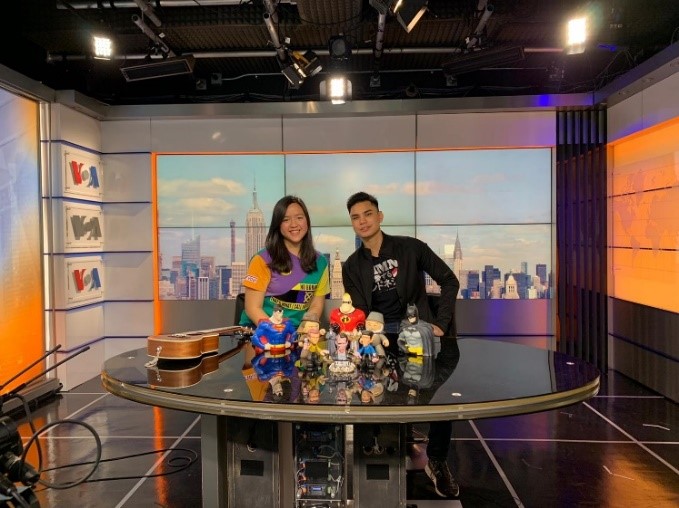
by Mohamed Elshekh | May 19, 2020 | Internship Experiences, Undergraduate Students
My name is Eugenia Audrey Utoyo and I am a senior undergraduate student studying Diplomacy and International Relations. I recently completed an internship with the Voice of America (VoA) in their office in New York City.
The Voice of America is a governmentally funded multimedia agency that broadcasts news topics from all across the globe. They provide a comprehensive coverage of the news ranging from international affairs and U.S elections to pop culture and entertainment. Although Voice of America is primarily a U.S News agency, they also represent several major countries like Turkey, China, and Russia.
At VoA I worked as a Media Intern. My main responsibilities included cooperating with VoA’s Indonesia branch and coordinating tasks with my supervisor who was a renowned TV and film producer. One of the most exciting tasks I got to work on as an intern was the production of a new show titled Border Crossings. This show, hosted by one of my coworkers, broadcasts the latest in American music entertainment to audiences in Indonesia. A number of accomplished artists including, Jon Bon Jovi, O’Town, and Paul McDonald have appeared on the show. This aspect of the internship was particularly valuable because it was relevant to some of the lessons learned in my Diplomacy courses about transnational communication and globalization.
During one of the show’s segments, I was given the opportunity to learn how to host the show and work the camera equipment. Being a guest host requires that one consider the timing and delivery of their lines whilst being conscious of their facial expressions and movements on-camera. It was an experience that took me out of my comfort zone. Although I was incredibly nervous about being on camera, I recognized that this was an opportunity that would enhance my own professional development.
Being at Seton Hall University’s School of Diplomacy provided me with the necessary skills to excel in this position. My background in international relations made me accustomed to the ever-changing nature of the television production studio. At the School of Diplomacy, we learn to constantly inform ourselves on international news developments whether it be climate change, international conflict, or refugee crises. Working at a multimedia news agency is much the same. The time I have spent at Voice of America has been impactful for my own professional development, as well as my growth as a student. The skills that I have learned with Voice of America will certainly help me as I enter the job market and prepare for the next opportunity.
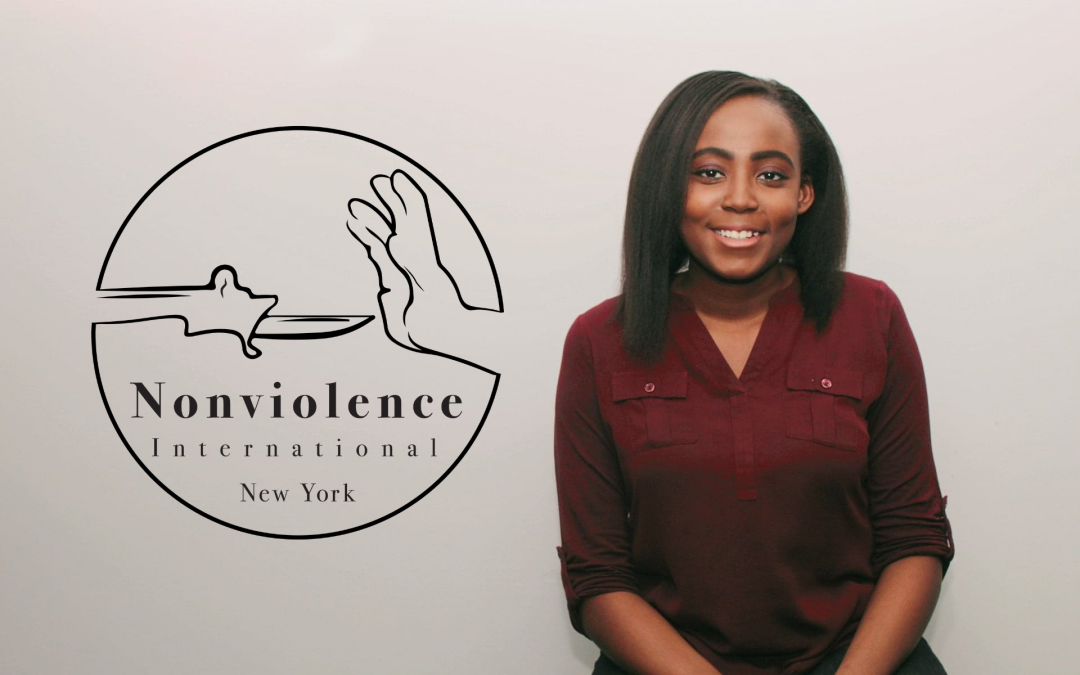
by Mohamed Elshekh | Feb 28, 2020 | Internship Experiences, Undergraduate Students
My name is Glory Akoh and I am a junior at Seton Hall University majoring in Diplomacy and International Relations as well as Modern Languages with a minor in Economics. I am currently interning with Nonviolence International NY (NVINY), located in Harlem, as a Media and Marketing Representative. NVINY is an international humanitarian organization that advocates for nonviolent solutions during violent and oppressive situations. It conducts research, produces projects, and hosts events on a growing number of issues that relate to disarmament, sustainable peace, and American politics.
Founded in 2014, NVINY has always been fueled and inspired by the active engagement and passion of the youth – this is evident in their constant recruitment of interns and volunteers. I recognized how dedicated the organization was to the success of young people after hearing the team express their support for my professional aspirations in the field of diplomacy. With the support of the United Nations Department of Global Communications (UNDGC), NVINY ensures that all the interns are given access to multiple meetings and conferences at the United Nations. All the interns, including myself, can be seen walking the halls of the UN Secretariat and sitting in on General Assembly sessions every week, if not every day.
As a Media and Marketing Representative, I oversee NVINY’s social media presence. This means developing and sharing content related to the progress of the UN Sustainable Development Goals and the daily operations of our resource center. I also cover news and exclusive research from our sister organizations and civil society groups across the U.S, as well as reports concerning different UN meetings that our staff attends. These responsibilities enable me to thrive because they directly align with my professional ambitions. I collaborate with interns and supervisors from Russia, Germany, France, Mexico, Ireland, and China. On any given day, conversations in German, French, and Spanish are being held between people from different parts of the world. Having lived in three different countries, ethnic diversity is another component of NVINY that makes me feel at home.
I have never felt prouder to be a student of the School of Diplomacy and International Relations at Seton Hall than I did during a Plenary First Committee meeting, which I attended a few days ago. I listened to the delegates of China, Poland, Australia, Uruguay, Argentina, and many others, voice the concerns of their respective countries on the issues I learned about in the classroom. Denuclearization, humanitarian crises, climate change, and international governance are just some of the topics that were discussed. This experience, coupled with the fact that I was covering the session with our Media Team, helped me realize how I could merge my two career interests. Interning with NVINY showed me how the theories and concepts learned in the classroom are relevant to the real-world conversations that are happening every day at the United Nations.
I am grateful to the School of Diplomacy and International Relations for including an internship requirement in the curriculum. The entire process of updating one’s resume, applying for internships, being interviewed, and ultimately being thrown into the professional world, prepares students for what a career in the field of diplomacy will look like.
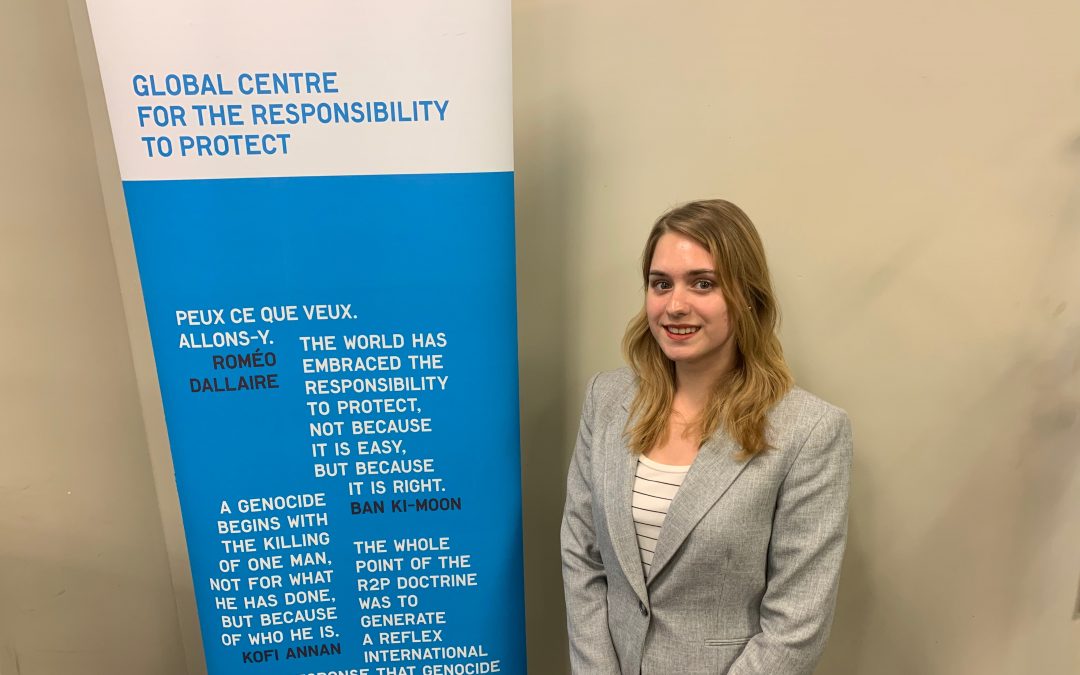
by Madison McHugh | Dec 10, 2019 | Internship Experiences, Undergraduate Students
My name is Stephanie Miller. I am a senior undergraduate student in the Diplomacy and International Relations program with a secondary major in Religious Studies and a minor in Arabic. I completed a research internship at the Global Centre for the Responsibility to Protect in Manhattan, New York.
The Global Centre is a research and advocacy organization that specializes in war crimes, genocide, ethnic crimes, and crimes against humanity. It works with governments, regional bodies, and other NGOs to operationalize the principles of the Responsibility to Protect doctrine into policy frameworks. It also monitors over 20 country situations either at risk or currently committing mass atrocities. As independent institutions, non-profits like the Global Centre are instrumental in ensuring accountability and encouraging inter-governmental action to prevent mass atrocity, and I had a wonderful time working with them.
My decision to pursue this internship was based in curiosity. Mass atrocities are crimes that make international headlines every day, but the corresponding prevention agenda is not something that people usually recognize, even in the classroom. The Global Centre works to bridge the gap between policy and responsible action, calling for the international community to commit to the principles outlined by the Geneva Convention and honor their agreements to protect civilians across the globe. I learned that while this work is not glamorous, it is entirely necessary.
Interning at the Global Centre taught me the difference between humanitarian work and human rights advocacy, cultivating a newfound interest in both. Prior to this internship, I thought that the two terms were mutually interchangeable, and I found that this a common misconception often overlooked. This experience taught me new and transferable skills that are applicable to both fields, honing practical expertise in report writing and analysis, oral communication, conflict mediation, and public engagement. I don’t think I could have found a more supportive and encouraging environment as I developed these new skills, and I look forward to carrying them into my career.
One of the challenges I faced in the beginning of my internship was separating myself from my work. The subject material I was dealing in daily was sometimes difficult to process, and in order to succeed in the position, I had to learn how to leave work in the office rather than take it home with me. I began setting healthy boundaries for myself before I could devote my time and energy to a mission that I quickly grew to care about. This internship taught me more than just practical skills – it taught me a life lesson that many don’t learn until much later, and for this I will always be grateful.
My advice to students looking for internships is to not limit yourself to searching only in the field you are interested in. Diversifying your interests enables you to take advantage of opportunities that you may not have had otherwise. My career goals were vastly different going into this internship than they are now. Working at the Global Centre made me re-evaluate my priorities and consider what I really want to do with my degree after I graduate, which is something I do not think I would have been forced to reckon with if I had worked anywhere else. Internships do not always change your outlook on life, but mine did. I gained new skills, new interests, and a new perspective on the field I want to go into.
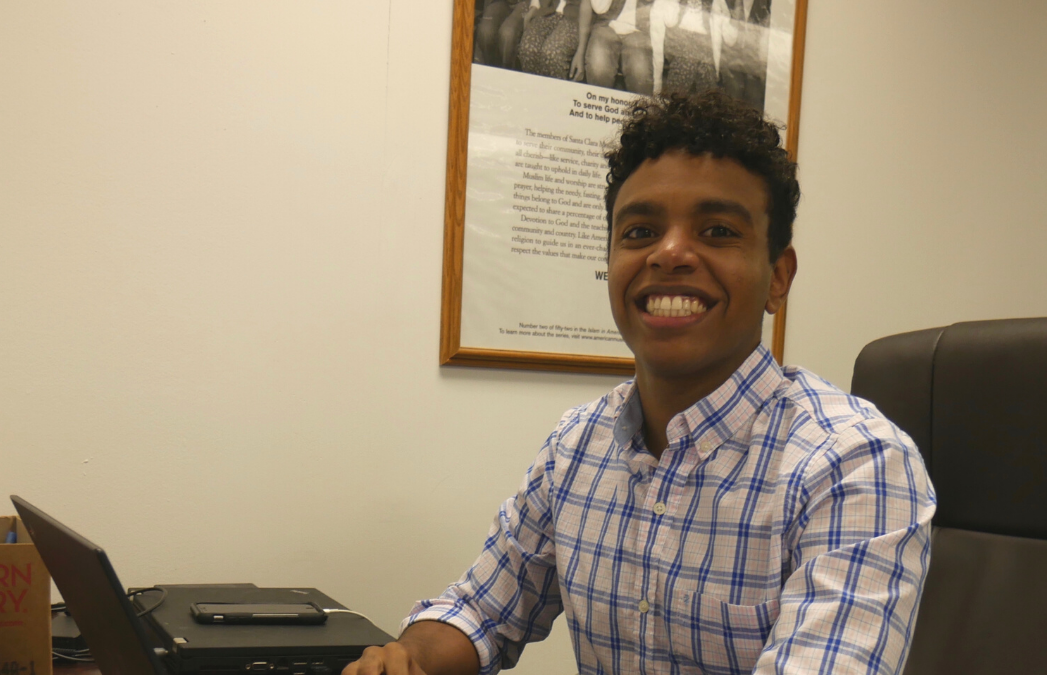
by Madison McHugh | Nov 7, 2019 | Internship Experiences, Undergraduate Students
My name is Mohamed Elshekh, and I am a senior at Seton Hall University studying International Relations and Diplomacy as well as Religious Studies. I interned at the Council on American Islamic Relations, New Jersey Chapter (CAIR-NJ), as the Government Affairs Coordinator. My primary concern while searching for internships was finding a position that combined my passions for diplomacy and religion. CAIR-NJ serves as the largest Muslim civil rights organization in America, with chapters all across the country. This was the ideal position because their goal is to enhance Americans’ understanding of Islam, promote tolerance and justice, and empower American Muslims across the United States.
With CAIR-NJ, I was tasked with communicating the needs of CAIR to various political campaigns and government officials. My biggest responsibility was planning for the Muslim Day of Advocacy (MDA), an annual event held in Trenton, NJ where various Muslim delegates meet with elected officials to advocate on behalf of the Muslim community and educate on concerns. I was tasked with drafting talking points for MDA, preparing a fact sheet of the bills we will be supporting, and recruiting delegates who will be present the day of the event. In addition, I scheduled meetings with government officials so that we would have time to properly prepare our delegates before the meetings and so they would be able to speak about the bills in the NJ legislator and explain why the Muslim community either supports or rejects the proposed bill.
The work I completed with CAIR has transformed my outlook on civil rights work and domestic policy. I believed that as a Diplomacy student, my interests would only align at an internship that focused on issues relating to the international community. With CAIR, I learned that these small steps taken to change domestic policy can have far-reaching effects that alter international policy.
Seton Hall’s School of Diplomacy provided me with the necessary skills to excel in the position. My background in International Relations and U.S foreign policy was essential for communicating with government officials and their staff, as well as creating fact-sheets and writing on behalf of the goals of CAIR. I recommend this internship to students who have a passion for civil rights and advocacy. This position served as a vital tool to my personal and career development. The professional skills and knowledge that I gained from CAIR will continue to help me after I graduate college and enter the job market.











